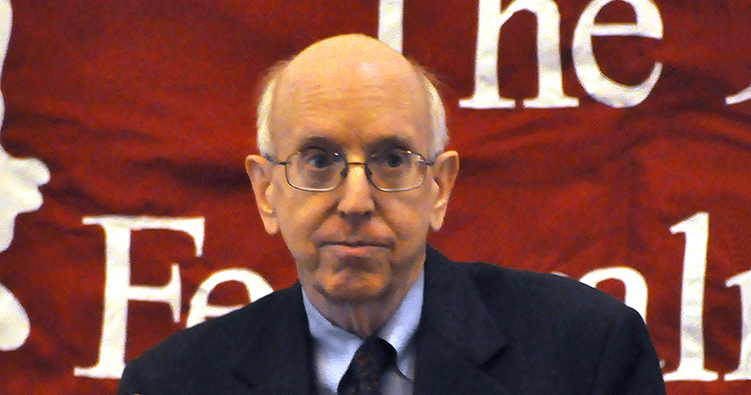Posner brief accuses judge of laziness for copy-and-paste order

Richard Posner. Photo by chensiyuan, via Wikimedia Commons.
Former appeals judge Richard Posner is criticizing a judge who copied and pasted from a government motion in an order that dismissed a pro se litigant’s First Amendment complaint.
Posner presented his argument in a reply brief filed on behalf of his client, William Bond, who was representing himself before Posner entered the case. Posner was formerly a judge on the Chicago-based 7th U.S. Circuit Court of Appeals.
Bond contends three federal judges conspired to throw a federal case and misused federal agents in an attempt to subvert his planned demonstrations in August 2013 at the federal courthouse in Baltimore. The case is before the Richmond, Virginia-based 4th U.S. Circuit Court of Appeals.
Posner says the federal judge exhibited “laziness” by copying and pasting, and then failed to explain why Bond’s amended complaints fell short. Posner illustrated with a side-by-side comparison of the government motion and the judge’s opinion. There were minor differences.
“The district court’s laziness leaves a pro se litigant with the perception that the judge did not independently analyze Bond’s complaint,” Posner wrote. “The district court’s actions create the impression of plagiarism and an abdication of its independent judicial duties.
“Article III district courts have the resources to produce more than a copy-and-paste job, followed by two unexplained orders and unsupported accusations of wasting judicial resources. This response to a pro se litigant only feeds into an unhealthy distrust of the judicial system—especially as access to justice becomes more limited, as fewer cases reach a jury, and as more cases are shunted to arbitration.
“Litigants, particularly pro se litigants such as Bond, must not have the courthouse doors closed to them without a reasoned explanation.”
Bond is seeking to reopen the case and file a second amended complaint. A statement of the case filed by the government begins with a description of Bond. According to the government, he is “well-known in the Baltimore area for his protests against certain members of the federal judiciary, whom he has dubbed the ‘White Guerrilla Family.’ ”
According to the government, federal agents had questioned Bond due to concern about the safety of judges and federal officials, leading Bond to file a complaint alleging the questioning was aimed at chilling his First Amendment rights. He protested anyway, leading the court to dismiss the complaint, according to the government.
Posner counters that Bond’s second amended complaint described “extraordinary circumstances” in which federal judges displayed “judicial antagonism” toward Bond in discussions with third parties and Bond himself. The worry and distraction caused by the questioning and learning he was under surveillance caused Bond to curb the robustness of his protests, Bond had asserted.
Among the defendants sued by Bond was then-U.S. Attorney Rod Rosenstein, who is currently the deputy attorney general overseeing the special counsel investigation of Russian influence in the 2016 election. Bond had claimed Rosenstein was told to ignore or cover up the conspiracy against Bond.
The case is Bond v. Hughes.
Corrects spelling of “guerrilla” in eighth paragraph at 3:52 p.m.
Write a letter to the editor, share a story tip or update, or report an error.


